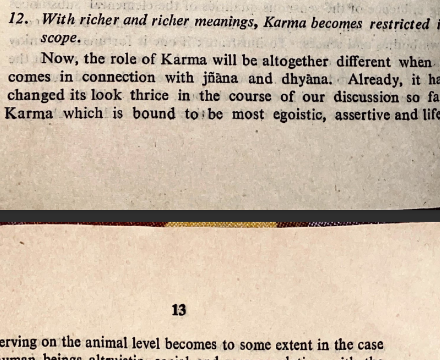Now, the role of Karma will be altogether different when it comes in connection with jñāna and dhyana. Already, it has changed its look thrice in the course of our discussion so far. Karma which is bound to be most egoistic, assertive and life-preserving on the animal level becomes to some extent in the case of human beings altruistic, social and accommodative, with the rise of the sacrificial cult and the emergence of an enlightened society. Now, any karma, howsoever it may be useful for the preservation of the species and the individual, will not suffice for maintaining the religious impulse of propitiating the deities as well as the moral fibre of the social structure. To talk about karma at this level adequately is to talk about it in terms of sacrifice, charity, penance and self-denial, and not in terms of the physical, physiological, mechanical, reflex or involuntary activity which is necessarily going on in the universe to keep up the economy of Nature. Karma, at the level of sacrifice and morality has got only a restricted scope and a richer meaning than the other types of karma, namely, the physical etc., which have got larger scope but restricted meaning.
Next, when we rise to the level of devotion, whether it is directed to the Personal or the Impersonal aspect of God, Karma becomes further restricted in scope by being divested to a considerable extent of the dross of selfish motives and expectation of gains, whether they may be from gods or men. Karma here is motivated by love which a man feels for God; what keeps him interested in doing that is the joy of having communion with God, and what he expects in return from God is His love and grace on him. No doubt, along with this he might wish to have mundane and material pleasures; but this zest for satisfying the hedonistic urge of life is bound to be on the decline, as his love and joy in offering his several activities to God as flowers or material of worship would increase. The self-denial and the moral uprightness of the earlier stage will be there no doubt in everything what he does; but that alone will not constitute the karma of the devotional level. The Karmayogis of the devotional type will be fewer in number than the karmayogis of the moral type, just as the latter will be fewer in number than those who perform the various sacrifices only. The karma of devotion will, on the contrary, be richer in meaning than the karma of the moral life, just as the latter will be richer in meaning than the activity of bargain involved in a sacrifice.
Even so, when we rise from the devotional attitude to God and the consequent mental offerings to Him of whatever we do, eat, drink etc., to the concrete act of silent meditation on the Name of God or contemplation on the forms of His vision, our karma becomes so much restricted in scope as to include nothing but meditation and contemplation. Not only is there now no necessity of lighting the fire and acquiring the materials for offerings in the fire, but also no necessity of being over-anxious to see whether our actions are good and full of devotion or not. For, all this is bound to be there if our karma of meditation and contemplation goes on regularly and for a long time unhindered and without making any exception. Whatever then we shall be doing when we are not engaged in meditation and contemplation is bound to fall in line with it and therefore shine by the lustre of God. We shall then know the significance of what Krsna says about his own divine works and life, and get ourselves liberated by being like him (4,9). It is only an ‘unswerving and undisturbed devotion to God, comparable to an unflickering flame’, which will enable us to know “the infinite extent of God, to see Him and to enter into Him” (6.19; 11.54).

